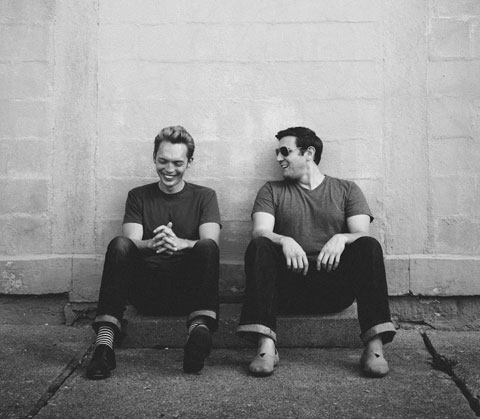 The Minimalists: Joshua Fields Millburn (left) and Ryan Nicodemus (right). |
Wanna play the Minimalism Game? First, find a friend, family member, or significant other who’s looking to cut the fat, stuff-wise. Then, agree that this month, you will get rid of things — clothes, household items, knick knacks, that-thing-you-keep-for-sentimental-value-but-you-can’t-even-remember-the-sentiment — according to the following rules: Day One, you’ll donate, sell, or trash one item. Day Two, two items, Day Three, three items...See where I’m going with this? Whoever lasts longest, wins. Should you make it the entire month, you’ll have let go of 500 things, says Joshua Fields Millburn — and you’ll probably feel better for it. “I was a lot happier after eight months of simplifying my life,” he says.
Millburn is touring the country with his childhood friend, Ryan Nicodemus, promoting both their book, Everything That Remains: A Memoir by the Minimalists, and a way of life. “Minimalism is a lifestyle that helps people question what things add value to their lives,” they write at their website, theminimalists.com. “By clearing the clutter from life’s path, we can all make room for the most important aspects of life: health, relationships, passion, growth, and contribution.” Millburn came to this philosophy by way of his mother’s death and the dissolution of his marriage; Nicodemus discovered its tenets through his friend. Both have pared down their life to the bare essentials, and want to give others the tools and inspiration to do so themselves.
The Minimalists’ take on simplification is more about why than how, Millburn says, speaking from the passenger seat of the “tour bus” — a 12-year-old Toyota Corolla — that’s taking them on a 100-city tour that stops in Portland on Friday evening. “It’s about living more deliberately. Questioning the things that add value in your life.” To answer those questions for himself, Millburn undertakes experiments: after going a month without television, he never brought one back into his home; after going two months without a smartphone, he did go back to using one, but differently — only for its GPS, music, and voice call capabilities, but without Facebook or email connection. “I don’t think minimalism is about deprivation,” he says.
Of course this is all well and good when you’re former corporate suit making a conscious decision to leave the rat race — and copious possessions — behind (as both MIllburn and Nicodemus did). Is minimalism even relevant to people struggling with student debt, gentrifying rents, and stagnant wages?
Recent numbers from the Bureau of Labor Statistics show that “it’s entirely possible for poor people to have much of the same material comforts — cars, TVs, computers, smartphones — as more affluent people, yet be trapped in low-paying jobs with little prospect of improvement,” as the New York Times reported. In other words, the burden of excess stuff can weigh on people at every point on the economic spectrum.
The Minimalists: Everything That Remains, by Joshua Fields Millburn and Ryan Nicodemus | Friday, June 13 at 7 pm | Longfellow Books, One Monument Way, Portland | Asymmetrical Press | 234 pages | $16.99